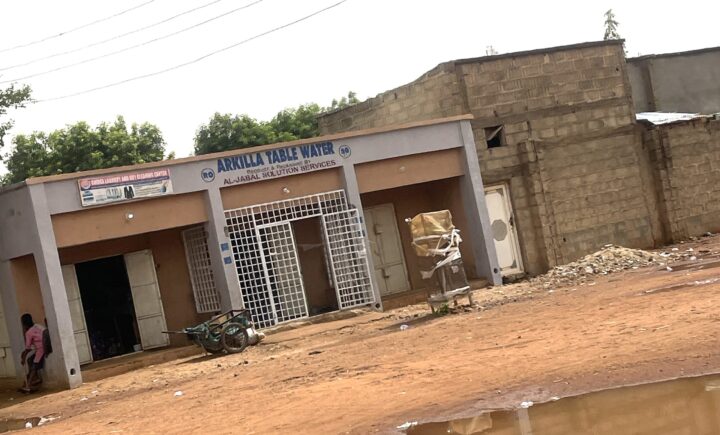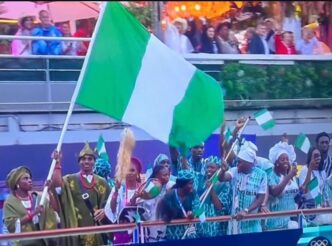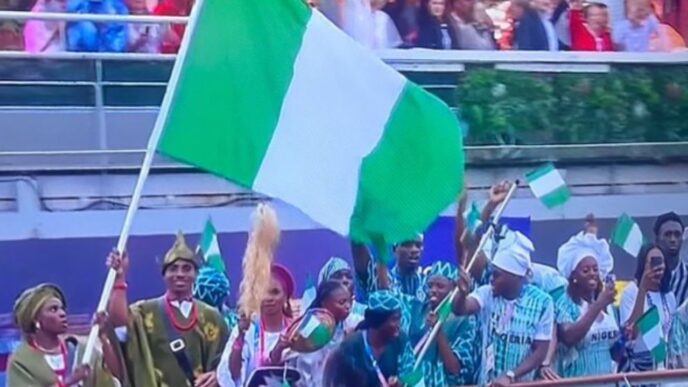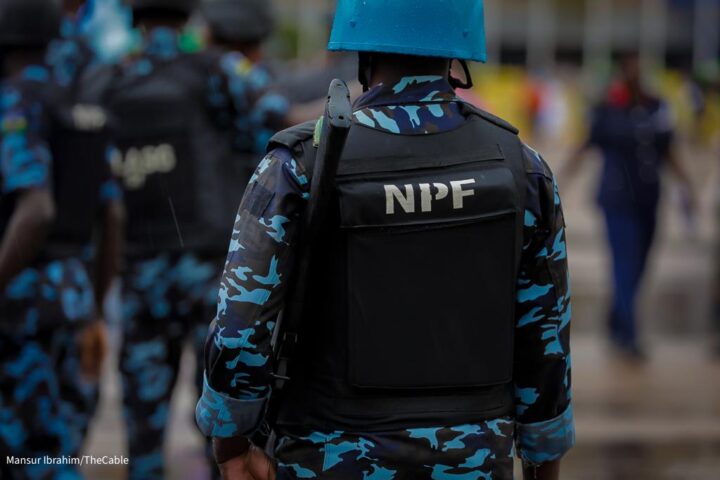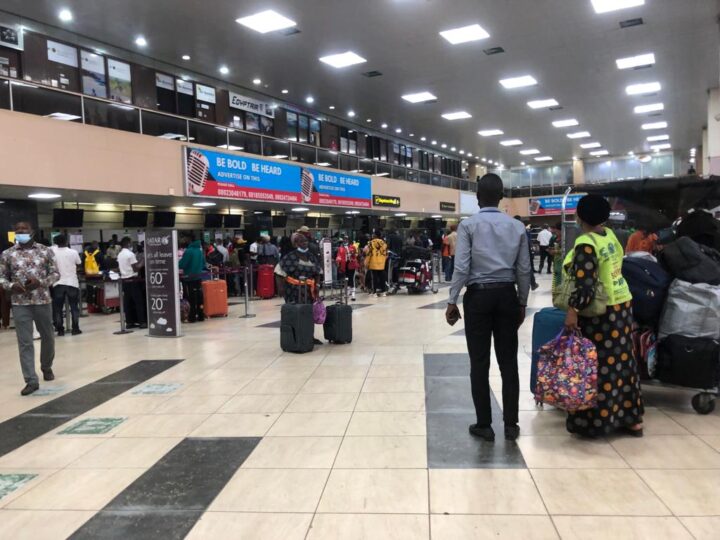Arkilla water factory was one of the companies investigated by the journalist
In this investigation, ABDULRASHEED HAMMAD exposed how 22 factories in Sokoto state produce contaminated water sachets without registration with the National Agency for Food and Drugs Administration and Control (NAFDAC).
In addition, about 12 sachet water factories are still in operation despite the expiration of their NAFDAC registration, raising questions about the regulatory body’s negligence in the state.
Sachet water is popularly called “pure water” in most parts of Nigeria. However, investigations have shown that these products are not close to anything pure.
Bala Manu Shana, a 60-year-old resident of Kuchi in Sokoto state, narrated how his 25-year-old son woke up with extreme abdominal pains and watery stools. He was rushed to Kuchi General Hospital because the community’s primary healthcare facility was non-functional due to a lack of medical personnel and facilities.
Advertisement
After conducting a series of tests, they discovered his son was suffering from typhoid and chronic diarrhoea caused by contaminated water. They were directed to Koko General Hospital for an X-ray, where it was confirmed that the disease had affected his intestines. They then rushed him to Birnin Kebbi General Hospital, where they spent three days without receiving proper medical attention. He was later transferred to another hospital.
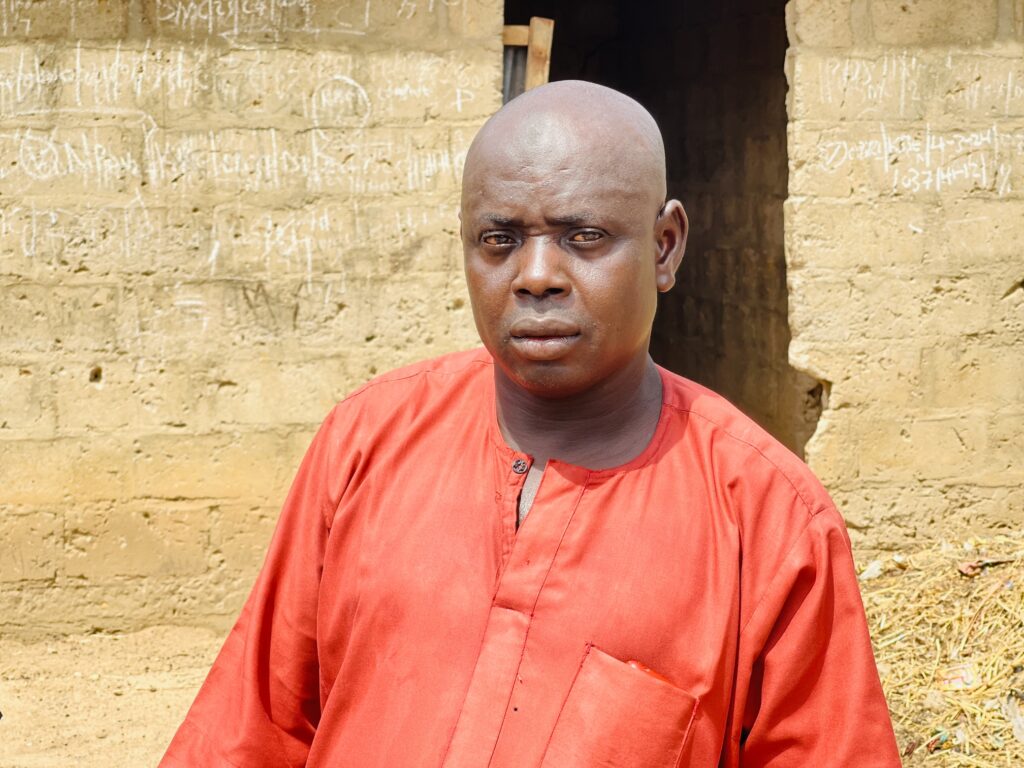
“After the test, we were instructed to do another X-ray. The medical officials said his intestines were affected but assured us they would handle it if we paid N300k. We agreed, hoping he would recover. Eventually, after the operation, just as he was recovering and we were about to be discharged, he died one Thursday evening at the hospital,” Bala lamented.
Due to the extreme heat in Sokoto, most residents resort to drinking sachet water to quench their thirst, making the “pure water” business lucrative. Sokoto, located in north-west Nigeria, experiences extremely high temperatures typical of a tropical savanna climate. During the dry season (March to May), temperatures often exceed 40°C (104°F), sometimes reaching 45°C (113°F) or higher, leading to dehydration and heat exhaustion.
Advertisement
Isiaq Ibrahim, a final year student of primary education at Usmanu Danfodiyo University, Sokoto, narrated his experience with a popular sachet water product on campus.
When he was in 200-level, Ibrahim liked reading at night in school. On one occasion, he brought food to class and bought four sachets of water to drink with his colleagues. When he was about to drink the water, he noticed numerous bacteria in the water he and his colleagues wanted to drink upon inspecting it with his flashlight.
”I could not believe what my eyes saw. I showed it to my colleagues, and we tested the three remaining sachets; it was the same. We felt depressed because it was midnight and we had no other water to drink. Some of us drank it anyway,” he said.
INSIDE SOKOTO’S LAWLESS SACHET WATER FACTORIES
Advertisement
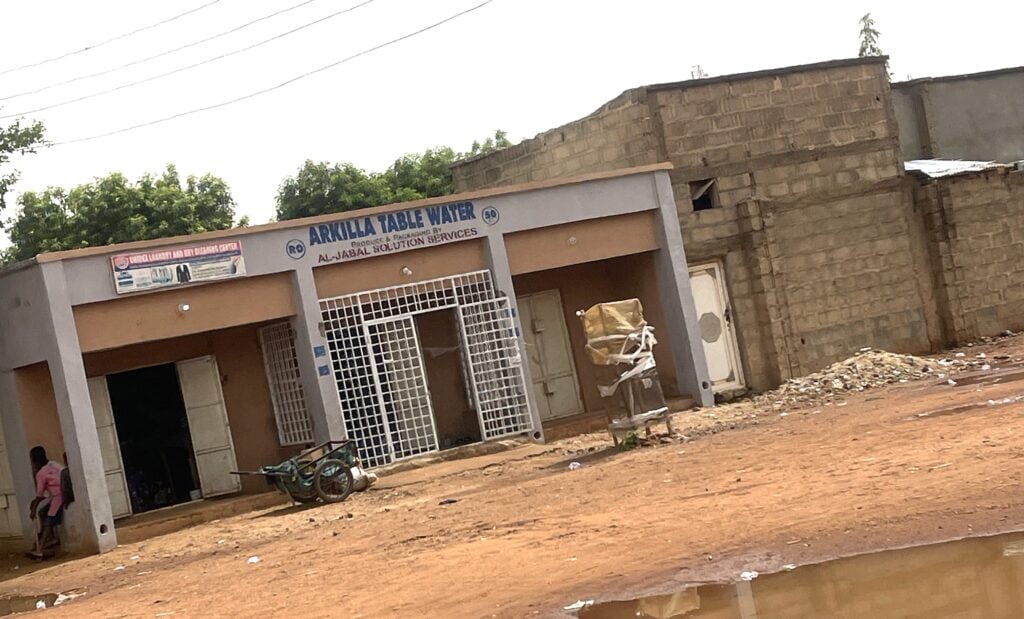
Findings by this reporter revealed that many water factories in Sokoto are not registered with NAFDAC and are producing contaminated water for consumption, prioritising profit over residents’ safety.
Some factories deceive residents by printing fake NAFDAC numbers on their sachet water, making people believe it is safe. Others do not include any NAFDAC number, while some keep running the factory after their registration expired, violating NAFDAC regulations.
One factory had been producing water before its registration, and another used different names on packaging and sachets, raising concerns about the misuse of the registration numbers.
In August 2021, NAFDAC sealed 38 water production companies in Sokoto for violating production laws, citing poor quality of sachet water and outbreaks of water-related diseases in the state. This was in response to a cholera outbreak in 2021 that affected 13 LGAs in Sokoto.
Advertisement
A search on the NAFDAC portal revealed that 12 water factories are not registered with NAFDAC but display fake NAFDAC registration numbers. Ten pure water factories have no NAFDAC registration numbers on their sachets, and 12 have expired registrations, but they are still producing water.
Nana Khadija Pure Water Factory, with NAFDAC number D1-9254L, has been producing “pure water” for the last four years as confirmed by the owner, but it was just registered on February 29 this year.
Advertisement
Mirhab Table Water with NAFDAC number A1-101293L shows a different name, Kom Table Water, on the NAFDAC registration portal, raising concerns about the potential misuse of another factory’s NAFDAC registered number.
Moya Table Water, with NAFDAC number E1-6894L, produced and packaged by Dankano Farms Nigeria Ltd is not registered with NAFDAC. In addition, Likisan Table Water with registration number E1-7340L is also not registered with NAFDAC; Nageno with number C1-8551L and Amare with number E1-4465L are not also registered.
Advertisement
Al-Sharif Pure Water with registration number E1-0164L, Kasuwar Arewa Table Water with registration number E1-6932L, and Nagenu Global Investment Nigeria Limited Pure Water with registration number C1-8551L are also not registered with NAFDAC.
Other water production factories not registered with NAFDAC include Albanati with fake registration number E1-4609L, Aqua-arg Table Water with registration number A1-10377741, produced and packaged by Amas Resources Nigeria Limited, 414 Table Water with registration number E1-7338L, Danjibo Table Water with registration number C1-2783L, and Nazman Table Water with registration number D1-4290L. Those registration numbers were not recognised on the NAFDAC portal, but the companies keep producing “pure water” for the Sokoto residents.
Advertisement
N.A.P Table Water, Nasarawa Pure Water Factory, KC Tech Pure Water Factory, DI-NAWA, Ajwa Pure Water Factory, Arkilla Pure Water Factory, Nagoranyo Pure Water Factory, Farinab Pure Water, Raudah Pure Water Factory and Ndwan do not have any NAFDAC registration numbers on their sachets.
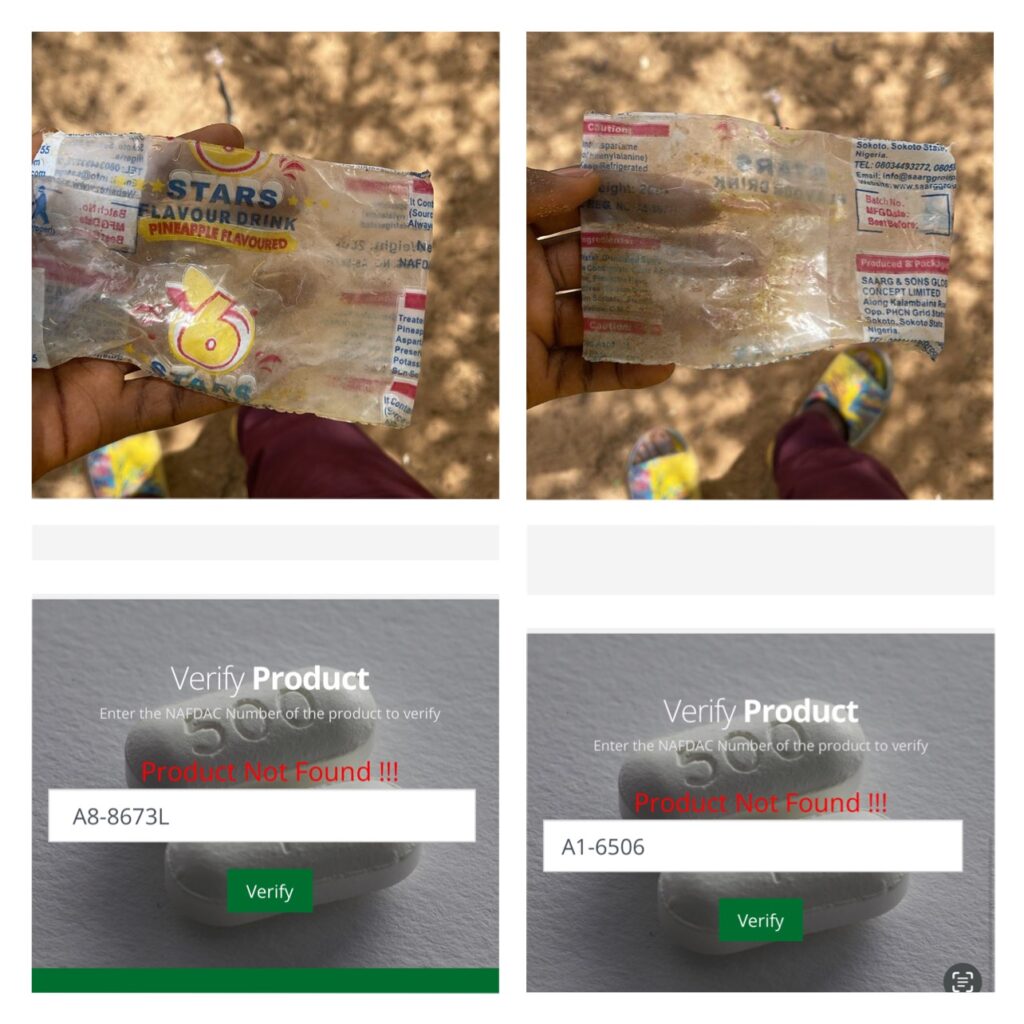
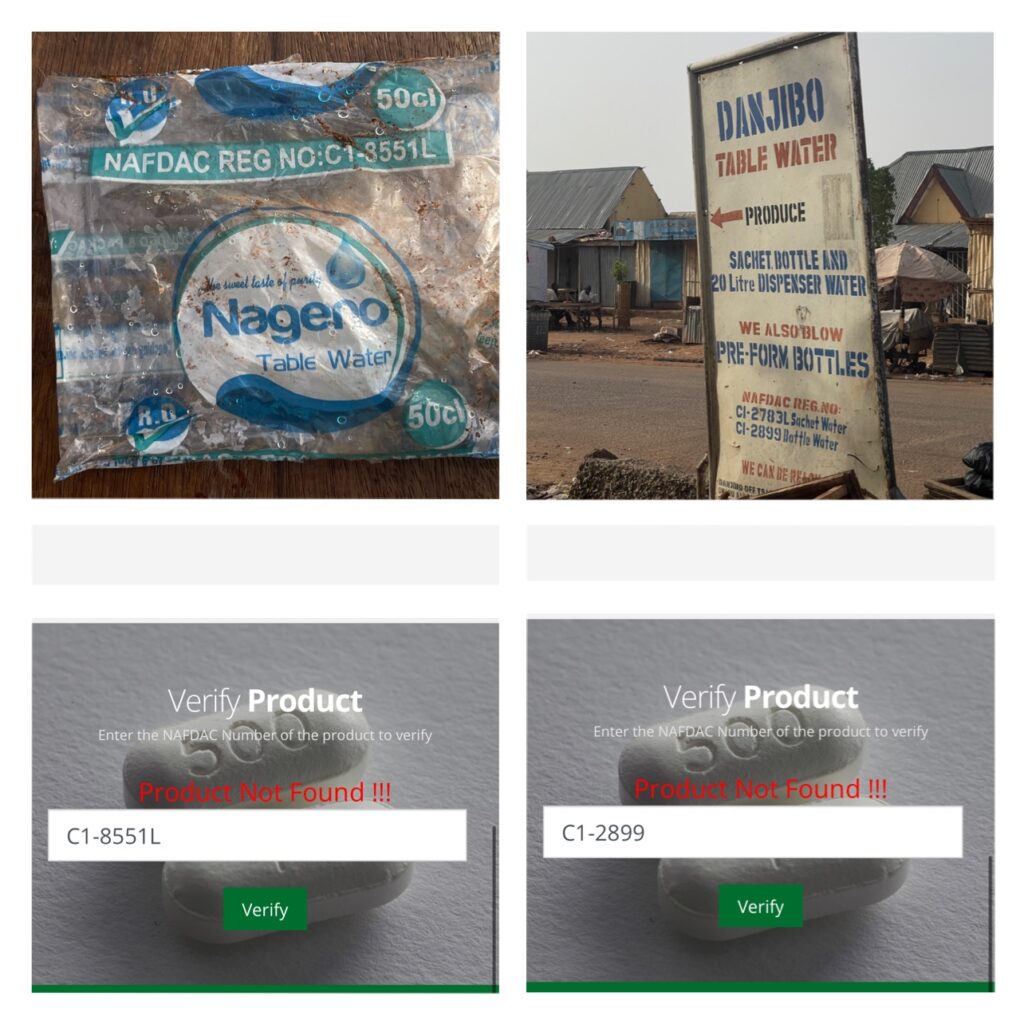
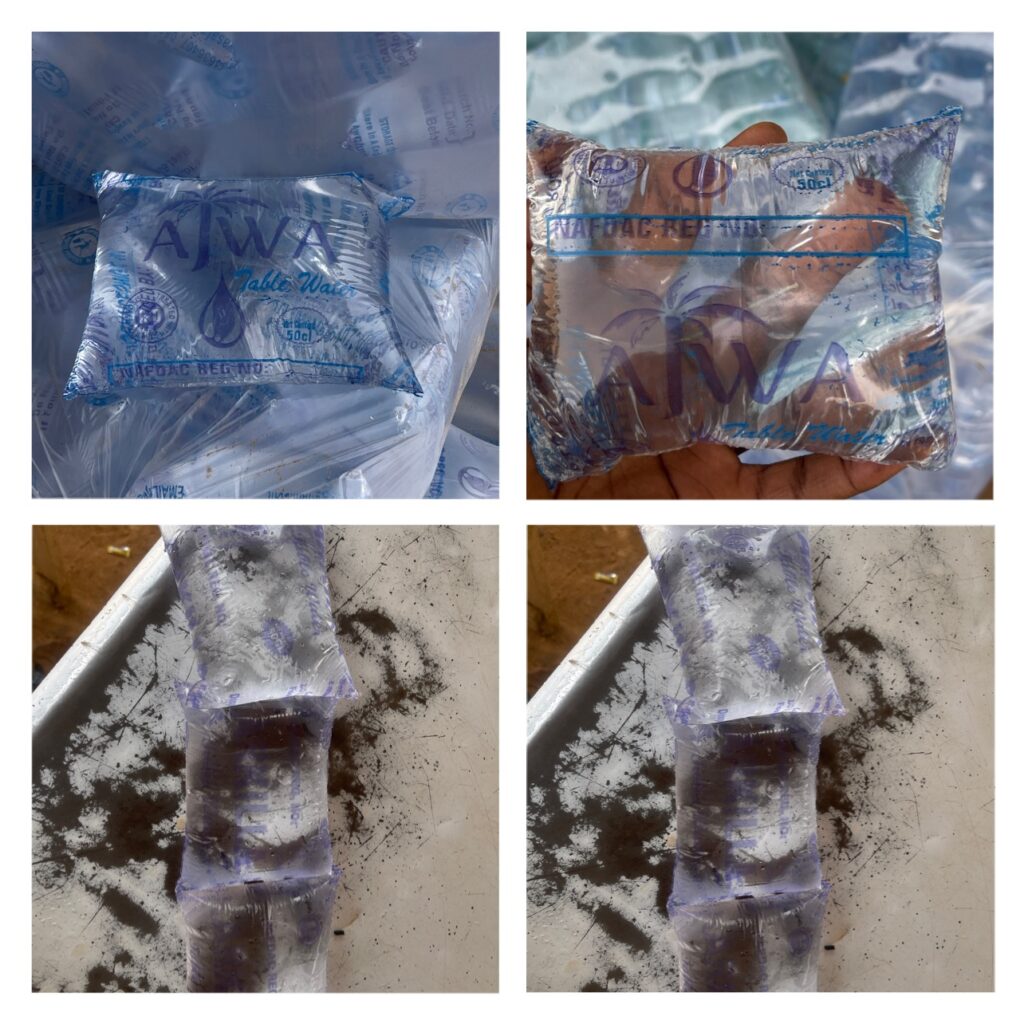
Operating a water production factory in Nigeria without NAFDAC registration is a serious offence punishable by fines and imprisonment. Under the NAFDAC Act, the agency is empowered to shut down unregistered facilities, confiscate and destroy all products, and prosecute offenders.
Abubakar Rufai, a scientist and laboratory technician at Usmanu Danfodiyo University Teaching Hospital (UDUTH), disclosed that tests on 16 “pure water” samples showed there are bacteria and microorganisms in six samples, posing severe health risks such as diarrhoea, stomach obstruction, constant stooling with blood, liver issues, and potentially leading to death.
The contaminated factories include Danjibo Pure Water (expired NAFDAC number C1-2783L), Shinnaf Pure Water (expired NAFDAC registration number), Ajwa Pure Water (no NAFDAC number), Milgoma Pure Water (expired registration number D1-9189L), Ssamered Pure Water (expired NAFDAC number E1-7341) and Al-Sheriff Pure Water (fake NAFDAC registration number E1-0164L).
‘CONTAMINATED WATER CAN TRIGGER CHOLERA OUTBREAK’
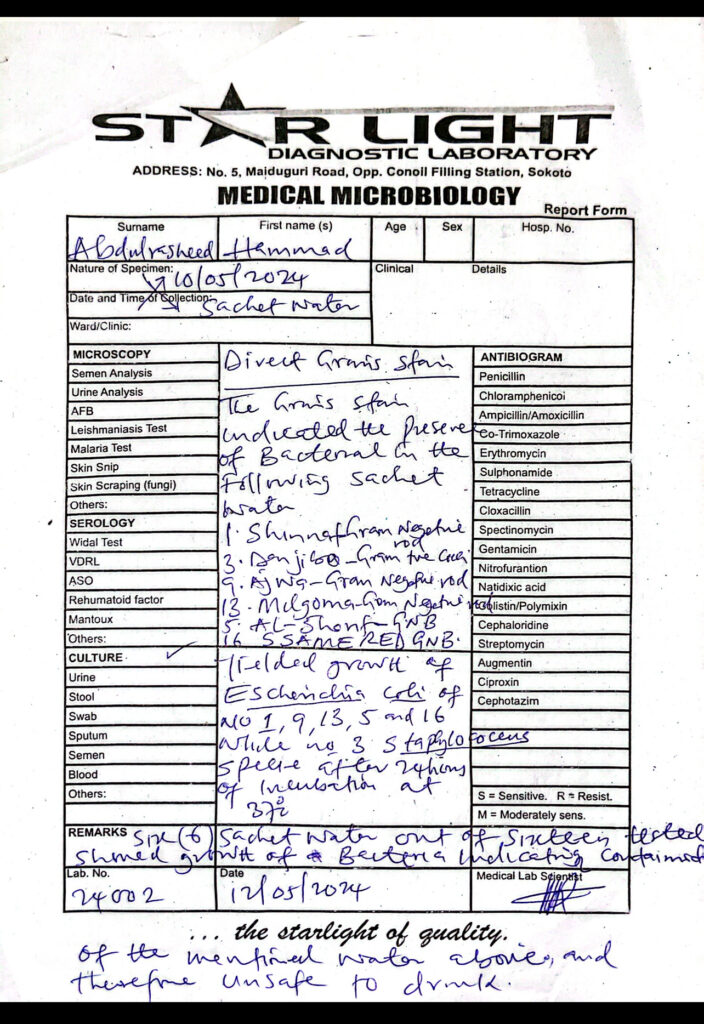
In an interview with this reporter, Jacob Legbo, a medical professor and plastic surgeon at UDUTH, said the diseases caused by contaminated water can lead to various gastrointestinal conditions, including gastritis and subsequent diarrhoea.
He added that in severe cases, this could trigger cholera outbreaks, which are epidemic in some states such as Lagos. The professor noted that the negative impact of the water depends on its content and contaminants, potentially affecting the liver and causing gastrointestinal disturbances.
Legbo said typhoid fever is a significant concern, characterised by gastritis, fever, and potentially life-threatening intestinal complications that can weaken the heart. He stated that typhoid can make intestines evaporate and when that happens, it is a matter of life and death — that is the chances of death are high. This is what probably led to the death of Bala Manu’s son.
“Waterborne diseases are a pressing issue, especially in states like Sokoto, where open defecation and improper waste disposal contaminate water sources, particularly during the rainy season. Contaminants, including high levels of iron and gastrointestinal materials, affect various bodily systems. Sokoto, like other regions, faces challenges from inadequate sanitation practices,” Legbo said.
He urged NAFDAC to ensure that factories producing water follow the rules and make water safe for consumption.
Ibraheem Omar, the director of the health services department at UDUS, noted the importance of NAFDAC registration for water production companies, stating that failure to regulate the factories could lead to uncertainties regarding the presence of harmful metals in the water source which can potentially cause lead poisoning, skin discolouration, liver damage, and other organ impairments.
“The borehole in the senior staff quarter and management has high iron content. So, we use a filter to remove it. An unregistered product doesn’t need to undergo any contamination testing because failure to register with NAFDAC is a criminal offence. Even if the product is of high quality, producing it without registration is considered a crime against the state,” he explained.
MANAGEMENT OF WATER COMPANIES REACT
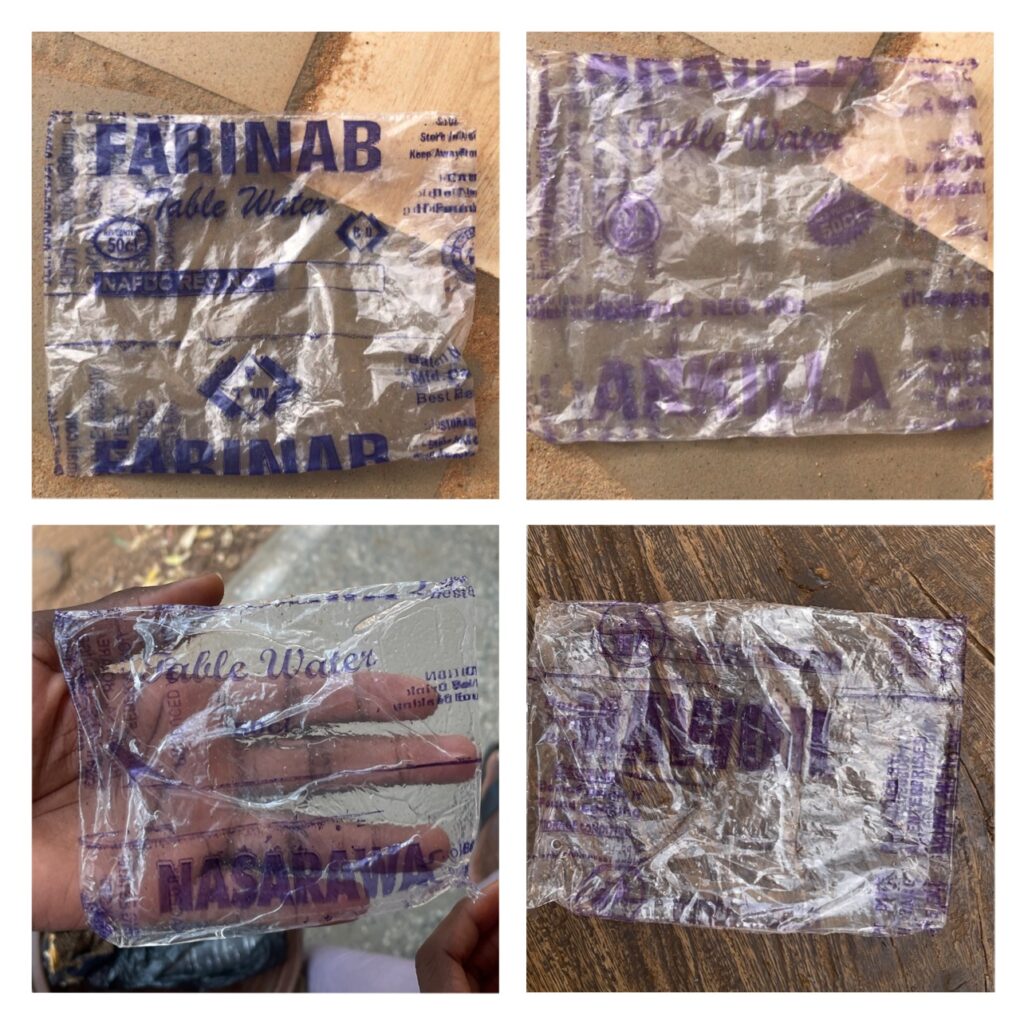
Some of the managers of the companies declined to mention their names after they agreed to speak to this reporter.
Abdulsomad Gosta, manager of Ssameed, said the company had renewed its registration three months before its expiration. He mentioned that an update on the NAFDAC portal was pending.
When asked about E. coli found in their sachet water during testing, he explained that all processes were supervised by NAFDAC, and no issues were found in the samples provided. He stated that there are plans to enhance water treatment using an RO Machine, but the company is currently relying on filters.
Faruku Yabo Abubakar, Likisan Pure Water’s managing director, stated the company had registered before, but admitted that it failed to renew it on time, resulting in the company being blacklisted from the portal. He said the company is currently meeting validation requirements from the Federal Inland Revenue Service and is waiting for NAFDAC’s follow-up.
Sheriff Pure Water’s manager confirmed that the company has been running a pure water factory since 2008 and it was registered the same year. He said he would discuss the reporter’s inquiry with the executive director.
The manager of B Fridaus, addressing the registration expiration on NAFDAC’s portal, said the company had renewed two weeks beforehand, though ideally, it should have been done three months prior. He said they were awaiting water clearance after NAFDAC sampled their products. Responding to complaints of particles in their water, he stated that contamination might occur probably downstream or some people are using their sachets to produce contaminated water. He assured that all issues would be addressed.
Abdus Pure Water’s manager said he had applied for registration renewal before Salah but hadn’t received feedback since submitting samples.
Abdoul-Naseer Abubakr, Moya Table Water’s manager, said his pure water company is registered with NAFDAC, but when this reporter requested a certificate of registration, he failed to provide further details.
Muhammad Ibrahim, the owner of Arkilla Pure Water Factory, told this reporter that some of the company’s products without a registration number were printed before obtaining NAFDAC approval. When he was asked to tender the approved registration number, he couldn’t provide one.
Bashir Malamee, Nageno Investment Pure Water’s manager, said he registered his company with NAFDAC, but when he was asked about his certificate of registration, he declined to comment.
“I can’t give you any information. I don’t know you. I am sorry, sir,” he said and hung up.
NAFDAC: WE’LL SANCTION COMPANIES FOUND WANTING
Garba Adamu, the coordinator of NAFDAC in Sokoto, asked this reporter to write an official complaint stating the names and addresses of the water factories that were not registered, those whose registration had expired, and sachet water found to contain E. coli after contamination. He promised that the agency would mount surveillance, conduct an investigation, and sanction the factories found guilty.
“Make a complaint through the website and they will direct it to Sokoto. You can submit it to our officers, and we will act on it. It is easier that way. If you give me a particular name, by tomorrow morning, they will go there and check. If there is a need, we can send the sample for laboratory analysis. We are proactive,” he stated.
Add a comment
